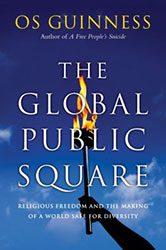by Os Guinness
240 pages, $12.80 from InterVarsity Press
Not every good idea needs a book to promote it.
Many of the best ideas are so simple and so self-evident that long explanations subtract more than they add. That’s not universally true, but it’s definitely true with the idea of freedom of religion.
The Global Public Square is the most recent entry in the Patheos Book Club. When Patheos offered me a review copy I recognized Os Guinness’ name but really didn’t know anything about him. His website describes him as “an author and social critic.” He was born in China where his parents were medical missionaries, was educated in England (including a doctorate from Oriel College, Oxford), and has written or edited thirty books. He describes himself as a Christian but at least in this book does not claim any denominational affiliation.
Let’s start with the good parts. Guinness begins with an important question:
How do we live with our deepest differences, especially when those differences are religious and ideological, and very especially when those differences concern matters of our common public life? In short, how do we create a global public square and make the world safer for diversity?
Guinness answers that question by turning to Roger Williams’ idea of “soul liberty” – the Christian idea that since every person is accountable to God, every person must have the liberty to worship God as he sees fit. Guinness expands “soul liberty” to “soul freedom”:
Soul freedom is the inviolable freedom of thought, conscience, religion and belief that alone does justice to the dictates of our humanity. … it best expresses human dignity and agency; it promotes freedom and justice for all; it fosters healthy giving, caring, peaceful and stable societies; and it acts as a bulwark against the countless current abuses of power and the equally countless brutal oppressions of human dignity.
In support of this idea, religious, cultural and political leaders from a wide variety of religious backgrounds have crafted the Global Charter of Conscience, a document that “sets out a vision of freedom of thought, conscience and religion for people of all faiths and none, and calls for the cultivation of civility and the construction of a civil public square that maximizes freedom for everyone.”
Religious prejudice and violence is one of the banes of humankind. The interconnectedness of contemporary life makes religious apartheid impossible, as though it ever was anything more than an excuse for getting rid of “the other.” The Charter proposes that at the least, we be civil and tolerant toward one another, respecting the “soul freedom” of others and expecting they will do the same for us.
As a polytheist, this makes good sense to me. There are many gods and goddesses – the ones I worship may not call to you. And even if you and I both worship Cernunnos, the worship and practice he demands of me may be very different from what he demands from you. I need not copy your practices in order to respect them, nor should I.
The Global Charter of Conscience is self-evidently true to most of us in the modern West, and the FAQ page on the Charter website adds plenty of context and depth to the document. Together, they make the case that the Charter is a worthy document, even if its ultimate effectiveness is questionable.
But in attempting to build an even stronger case for the Charter through The Global Public Square, Guinness detracts from its simplicity with a litany of ain’t-it-awful stories from around the world. He lumps “totalitarian governments, liberal universities [and] the gatekeepers of our public squares” together into one malefic stew of freedom oppressors. Although he says “there is no question of moral equivalence” between, say, Islamic governments threatening converts from Islam with death and American atheists trying to prevent sectarian prayer in government meetings, he makes such groupings over and over again throughout the book.
Guinness has some good thoughts in the book. He understands that appeals to religious authority are meaningless in the public square:
To make a persuasive public case under the conditions of contemporary pluralism means that advocates of any public policy have to translate their case into terms that make sense to others.
And he understands “persuasion is not imposition” – something I wish the Pagans who expect Evangelical Christians to swear off proselytizing would learn.
But Guinness continually conflates progressive causes with religious prejudice. He believes the Affordable Care Act is religious discrimination because it does not permit employers to decide which health services will be covered for their employees. And he says “some of today’s gay and lesbian activists have morphed from being victims to being victimizers in politically correct uniform.”
Still, Guinness is no fundamentalist. He says “we have reached the dangerous point where certain Western liberals are busily undermining freedom of religion and belief, and certain Western conservatives are equally busy defending it in a way that does it no credit.” But The Global Public Square makes me think he’s longing for the good old days when mainline Protestants ran the show, Catholics and Jews played along, Evangelicals were irrelevant and everyone else kept their heads down.
The Global Charter of Conscience is a good idea, and Guinness correctly identifies what it needs to become a reality:
The moral suasion of a declaration … the legal implementation of the rights expressed in laws … ongoing education and transmission of the rights and responsibilities from one generation to the next.
Sadly, The Global Public Square provides moral suasion only to those who share Os Guinness’ mid-20th century mainline Protestant worldview.














